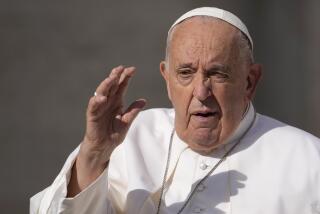Pope acknowledges colonial abuses
- Share via
ROME — Confronted with continued anger in Latin America, Pope Benedict XVI on Wednesday acknowledged that the Christian colonization of Indian populations was not as rosy as he portrayed in a major speech earlier this month in Brazil.
The pope did not apologize, as some indigenous and Latin American leaders have demanded.
However, he said it was impossible to ignore the dark “shadows” and “unjustified crimes” that accompanied the evangelization of the New World by Roman Catholic priests in the 15th and 16th centuries.
“It is not possible to forget the sufferings and injustices inflicted by the colonizers on the indigenous population, whose fundamental human rights were often trampled upon,” the pope said. “Certainly, the memory of a glorious past cannot ignore the shadows that accompanied the work of evangelizing the Latin American continent.”
Still, he said, recognizing the sins should not detract from the good achieved by the missionaries: “Mentioning this must not prevent us from acknowledging with gratitude the marvelous work accomplished by the divine grace among these people in the course of these centuries,” he said.
Benedict was addressing pilgrims gathered in St. Peter’s Square for his weekly public audience.
Benedict made his first papal voyage to the Americas this month, visiting Brazil. In his final and most important speech of the five-day visit, he gave what many saw as a revisionist account of history.
Indigenous populations, he said at the time, welcomed their European colonizers because they were “secretly longing” for Christ “without realizing it.” Conversion to Christianity “did not at any point involve an alienation of the pre-Columbus cultures, nor was it the imposition of a foreign culture,” he said.
The pope made no mention of forced conversions, epidemic illnesses, massacres, enslavement and other abuses that most historians agree accompanied colonization.
Indigenous rights groups, plus the presidents of Venezuela and Bolivia, were incensed.
The episode is the latest in which the pope, elucidating a theological point he firmly believes, made statements that appeared to ignore or disregard cultural and historical sensitivities.
The most explosive example occurred last year when, during a speech on faith and reason in Germany, he quoted comments by a Byzantine emperor widely seen as insulting to Islam. The speech triggered rage across the Muslim world, prompting the pope to make several subsequent statements, not apologizing for what he said but saying he was sorry for the reaction his words had caused.
*
More to Read
Sign up for Essential California
The most important California stories and recommendations in your inbox every morning.
You may occasionally receive promotional content from the Los Angeles Times.














